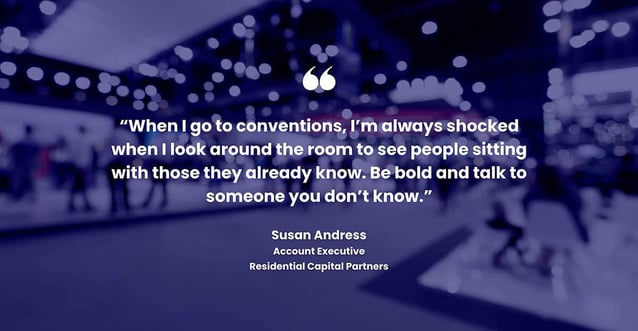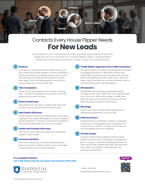
Networking is an essential skill for success in any industry. For house flippers, it can open doors to new opportunities, partnerships, and perspectives that can help you scale your business. (Even when interest rates are high!) Business cards and social media groups are a good start – but the following underused strategies will give you an edge over the competition.
Stay Close With Good Contacts, Literally
While the digital age has allowed us to connect with others across town—and across the world for that matter—in seconds, there’s no replacement for seeing good contacts face to face on a regular basis. Keeping your operations in close proximity to lead-generating contacts, like realtors, can pay off big.
Susan Andress, Business Development Director at Residential Capital Partners, recalls, “I know of one investor who had an office space open next to his. He advertised specifically to realtors to lease out that office to get that much closer, literally, to new leads.”
Download our list of Contacts Every House Flipper Needs For New Leads.
Make Yourself Useful
Flippers typically start as a one-man or one-woman operation—and it’s certainly a competitive industry. But there’s a lot that can be gained from operating collaboratively and sharing your knowledge with others.
Join local real estate investor groups online/in person and attend conferences, and be an active participant as much as possible: sign up for seminars, engage in discussions, share your insights, etc. Volunteer as a panelist speaker or workshop facilitator. The more people see your name and face, the more comfortable they will be with approaching you with potential opportunities.
Related: 5 Common Mistakes Seasoned Investors Make
Rep Your Brand
Networking is not just about making connections; it's also an opportunity to showcase your brand and establish credibility. Get screen-printed shirts featuring your company logo and URL and wear them everywhere, not just conventions: the bank, to lunch, the hardware store. Branded apparel is the cheapest billboard you can buy, and a conversation starter for just about anyone you meet.
When people inquire about your brand, it gives you the chance to introduce yourself and explain what you do. This simple tactic helps you leave a lasting impression and increases the likelihood of potential partners or investors remembering you when they come across opportunities in the future.
Have a 30-Second Pitch
Crafting a concise and compelling elevator pitch is mission crucial. Prepare a 30-second introduction that clearly communicates who you are, what you do, and what makes you unique. Be specific about your expertise and highlight any notable successes or specializations.
A well-crafted pitch grabs attention and prompts follow-up questions, creating an opportunity for deeper conversation. Refine your pitch by practicing it repeatedly, ensuring it flows smoothly and feels natural. Remember to tailor it to the context and the individuals you're speaking with, making it relevant and engaging.
Have a Few Key Questions to Screen New Contacts Quickly
Networking events can be overwhelming, with a constant stream of people eager to connect. To make the most of your time, develop a set of key questions that help you quickly assess the potential value of a new contact. These questions help you gauge whether the person's expertise aligns with your goals and whether there may be mutually beneficial opportunities for cooperation.
Related: What to Know About Your Private Lender

Related: 5 Ways Rental Properties Make You Money
Don’t Sit With Your Friends
Before Andress’ career in finance, she was a geologist in the oil and gas industry. Her change in careers left her with catching up to do when it came to building a large network. “At conventions,” she says, “I didn’t know a soul. I would go to every single person’s booth and it paid off. I’d come home with three or four opportunities.”
Her advice for flippers attending events: “When I go to conventions, I’m always shocked when I look around the room to see people sitting with those they already know. Be bold and talk to someone you don’t know.”
Sure, it can feel less than graceful to leave your comfort zone, but it gets easier with practice. Embrace the opportunity to learn from others, share insights, and establish new connections that can propel your house flipping business forward.
Listen More Than You Talk
We’ve known for a long time, but science has finally proven that people like you better the more questions you ask. While it's important to convey your expertise and interests, taking the time to listen to others can be immensely valuable. Actively listen to what others have to say, ask follow-up questions, and show genuine interest in their experiences and perspectives.
“Sometimes opportunities present themselves that you didn’t even know you were looking for.” Andress says, “But you have to ask the right questions to get there.”
Listening attentively not only helps you establish rapport but also allows you to learn from the experiences and insights of others. By understanding different perspectives and approaches, you can expand your knowledge base, gain fresh ideas, and potentially uncover new strategies.
Networking for Lead Generation
Building a robust network takes time, but the rewards are many. You’ll gain exposure to new strategies to grow your business, grow brand recognition, and build connections with lead-generating professionals like fellow investors, realtors, attorneys, and more. Remember: some of the best deals of your career can start with a simple “Hello.”

Download our list of Contacts Every House Flipper Needs For New Leads




